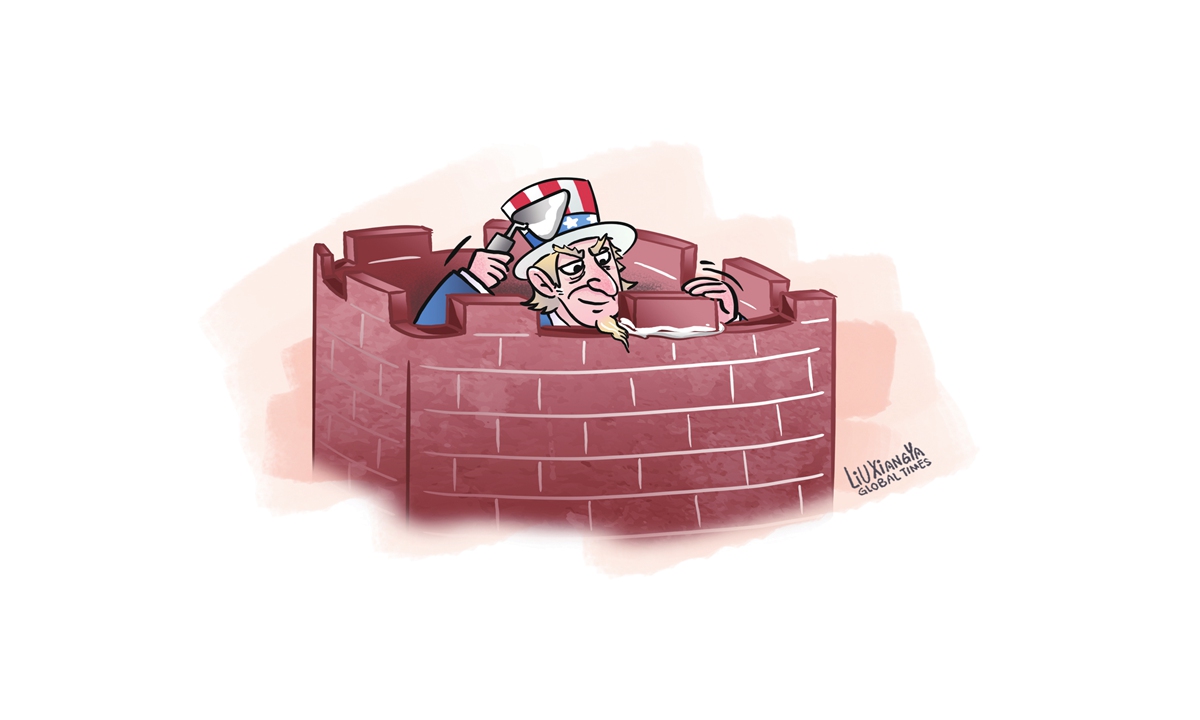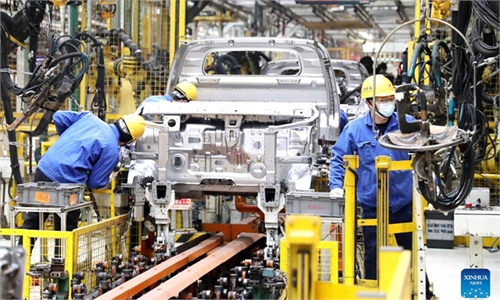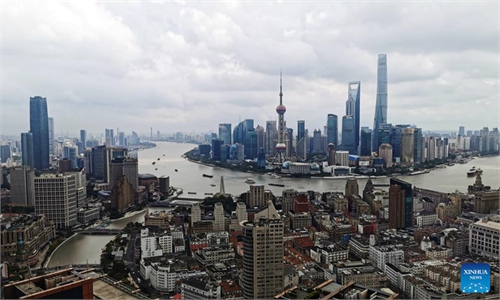
Illustration: Liu Xiangya/Global Times
US Treasury Secretary Janet Yellen, addressing the Asia Society in Washington last week, said that Washington needs a "serious, clear-eyed" economic approach to China, as it seeks to diversify supply chains across its allies in Asia. Though she said her country does not seek to "decouple from China," Yellen admitted that the US would not compromise on its national security actions, including banning exports of advanced semiconductors and manufacturing tools to China.In her speech, she repeated her desire to diversify supply chains to Asian countries through "friend-shoring," which means using trusted American allies as sources of supply. The US government's goal remains unchanged - to continue to diversify away from China economically, because China, ideologically and systemically, is not "a friend" but a "strategic rival" of the US.
In early November, the Biden administration plans to hold the seventh negotiating round for its "Indo-Pacific Economic Framework for Prosperity (IPEF)" initiative in San Francisco, aimed at reaching some agreements in time for the upcoming APEC summit. The IPEF is the White House's signature plan to engage economically with "friendly Asian countries" and provide them with a trade and investment alternative to China. In other words, the IPEF is the Biden administration's brainchild to "de-risk" from China.
It is widely known that Washington's assault on Chinese high-tech enterprises has been reckless and relentless, aimed at prolonging the technology supremacy of the US in the world. Earlier this year, the US imposed investment curbs on China's semiconductors and microelectronics, artificial intelligence (AI) and quantum computing technology. What Washington aspires to attain is to impede or stifle China's growth by cutting off Chinese enterprises from American high-tech supplies.
US National Security Advisor Jake Sullivan has been more direct, noting that the White House has adopted an approach called "small yard, high fence" to prevent American know-how and high-tech investment from reaching China, in order to slow down China's rapid development. Despite American politicians' claims of wanting to maintain normal and workable ties with China, their actions have actually poisoned and dismantled this relationship. Erecting a "high fence" to hinder others' growth is ungracious, if not savage.
Yellen said in her speech that the US was pursuing the "de-risking and diversifying" of its economic ties with China, by investing in manufacturing at home and by strengthening linkages with its allies and partners. However, fracturing and fragmenting the world's normal supply chains though "decoupling" or "de-risking" plans is ferocious and disastrous, which will lead to an increasingly divided world, reduced trade and personnel exchanges among countries, as well as severely depressed economies and aggravated poverty in the world.
In September, the World Trade Report 2023, issued by the WTO, warned that there is growing evidence that "geopolitical tensions are damaging" normal trade flows, as "a more fragmented world" isn't in the interests of any. Donald Trump's signature trade war against China starting in 2018 has resulted in "a tit-for-tat escalation of import tariffs" between the two giant economies, which hurt both deeply. With more administrative restrictions being announced on high-tech trade and manufacturing materials, "trade tensions are rising, and the first signs of fragmentation are emerging," said WTO chief economist Ralph Ossa.
It is true that in an increasingly fragmented, de-globalized world, the future of an open, predictable and intertwined global economy is under threat. The WTO report splits trading nations into two blocs, based on similarities in how they vote at the UN General Assembly, and it finds that goods trade among nations within the same bloc has grown approximately 5 percent more quickly than trade among nations from different blocs. Similarly, foreign direct investment is found to be substantially lower between geopolitically distant economies.
By all metrics, the Biden administration, with its growing protectionist approach, seems to have completely veered off the normal path of free trade and investment. Its economic and technology policies have accelerated the deconstruction of globalization since 2020. Some believe that US moves toward de-globalization and dismantling the global supply chain are "self-defeating" by depriving the US economy of the benefits of free trade and integrated development. Whether Biden's signature Chips and Science Act, and other industrial policy moves including doling out hefty subsidies for electric vehicle batteries and cars made in the US, will succeed remains to be seen.
But, a growing number of American businessmen do not agree with Washington's tightening restrictions on high-tech product exports to China, as the measures run against their normal business operations in China. US investors bemoan that they should not get entangled in the Biden administration's zero-sum games.
During meetings with senior Biden administration officials in Washington earlier, Intel CEO Pat Gelsinger, Nvidia CEO Jensen Huang and Qualcomm CEO Cristiano Amon warned that export controls risk harming US leadership in the high-tech sector. Obviously, the White House's bid to erect a "high fence" around its technology "yard" will backfire and harm America.
Facing the US government's "de-risking" high fence, Chinese companies have refused to raise the white flag. They consistently ramp up efforts to intensify research and development in order to survive under Washington's maximum pressure.
Take Huawei as an example. Huawei released its epoch-making Mate 60 series smartphones two months ago equipped with advanced 5G chips believed to be made in China. Leveraging its own rich tech deposit, encompassing hardware and software, the company is leading in the global contest in the digital infrastructure domain, including high-speed broadband, cloud computing, big data, the Internet of Things and AI.
For many years, globalization and integration have helped raise growth rates and pull tens of millions of people out of poverty. Now, anti-globalization and economic fragmentation, spearheaded by Washington, are eating away at the fruitful results of globalization. Protectionism, or closed-door isolationism, is doomed.
Washington's efforts to levy high tariffs on Chinese goods, ban advanced semiconductor exports to China, or impose investment restrictions on China's high-tech companies, are all protectionist, forcing Chinese enterprises to work hard on indigenization. When Chinese breakthroughs are made, like Huawei's 5G devices, market share could be permanently lost for American companies. If Washington sticks to "de-risking'" from China, more economic pain could be lurking.
The author is an editor with the Global Times. bizopinion@globaltimes.com.cn



